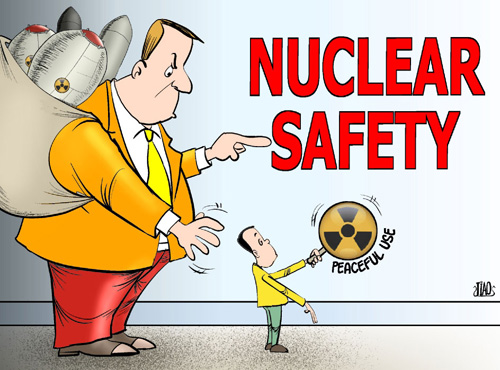Why global nuclear security is a major issue
- By Fan Jishe
 0 Comment(s)
0 Comment(s) Print
Print E-mail China.org.cn, March 29, 2012
E-mail China.org.cn, March 29, 2012
The Seoul Nuclear Security Summit, which concluded on March 27, was the second summit of its type, following the 2010 Washington Nuclear Security Summit. World leaders from 53 countries as well as the heads of four international organizations gathered in Seoul to review global progress in nuclear security since 2010 as well as discuss national measures and international cooperation with a view to strengthening nuclear security. Some national commitments were made, and a joint communiqué, which encourages international cooperation and national-level voluntary measures, was announced.
|
|
|
The bully [By Jiao Haiyang/China.org.cn] |
The original agenda of the Seoul Summit was expanded to include discussions on protecting radiological materials, as such materials could be used by terrorists to construct a so-called dirty bomb. This matter is of particular concern to developing nations.
Because of the recent Fukushima Daiichi nuclear accident, the question of nuclear safety issue was also addressed at the summit. Without doubt, the nuclear summit further consolidated the international consensus on nuclear security, and advanced global nuclear security objectives.
Substantive progress has been made, but strengthening nuclear security remains a huge challenge for the international community. Even though the U.S. and Russia, the world's two nuclear superpowers, have substantially reduced their nuclear warheads over the past two decades, they still maintain very large nuclear arsenals.
The United States declared a total stockpile of 5,113 operational nuclear warheads, as well as several thousand additional nuclear warheads which have been retired and are dismantlement. Russia has about 10,000 nuclear warheads as well as a large number awaiting dismantlement. Both countries still have tactical nuclear warheads in their arsenals.
The current global stockpiles of Highly Enriched Uranium (HEU) and separated plutonium are estimated at 1,500 tons and 500 tons respectively. Most of the globe's fissile materials are securely held by the United States and Russia, while other nuclear materials are less-securely scattered across more than 30 countries and may, therefore, be vulnerable to theft. The problem is that not all of the summit's participants view the threat of nuclear terrorism in the same way, and nuclear security may not be a high priority issue for all countries possessing nuclear materials and facilities.
Perhaps a more worrying factor still is that an increasing number of developing countries have become interested in developing nuclear power plants. Such a trend could pose a real challenge to global nuclear security, since most of these countries lack experience in dealing with such issues.
The Nuclear Security Summit is a good platform to address these challenges, but the summit itself is far from enough. Considering the fact that the world's major powers, especially the U.S. and Russia, hold the largest stockpiles of nuclear warheads and fissile materials, they should assume a greater share of the responsibility for strengthening global nuclear security. There are a number of measures they could take.
The first step might be for both the U.S. and Russia to narrow the role played by nuclear weapons in their security strategies. This could lead to a joint reduction of their nuclear arsenals, either unilaterally or bilaterally.
There appears little doubt that their strategic nuclear weapons are well secured; however, tactical nuclear weapons, which are smaller, easier to transport, and which are, in some cases, deployed in other countries, remain vulnerable to theft. Since the end of the Cold War, several nuclear disarmament treaties have been negotiated. However, none addressed the issue of tactical nuclear weapons. It is crucial, then, that both countries consider the possibility of withdrawing their tactical nuclear weapons deployed in other countries, which would reduce the overall number dramatically.
Second, both the U.S. and Russia should accelerate the fissile materials repatriation process. During the Cold War era, both the U.S. and the Soviet Union exported many nuclear reactors for civilian use and provided HEU as fuel for these reactors. In order to minimize the use of HEU, both countries have worked extensively to repatriate these supplies of HEU over the past two decades. However, the time has come for them to accelerate the process in order to reduce the threat posed by nuclear terrorism.
Third, major powers and those developed countries with experience in dealing with issues related to nuclear security could help other countries to strengthen nuclear security, as those other countries may have the political will to do so, but they lack experienced personnel, the necessary technology and funds. Major powers and other developed countries, could, therefore, provide aid in the form of financial support, technological assistance and systems, and training in order to advance the cause of increased global nuclear security.
Four, major powers should establish a global nuclear fuel bank on the basis of consensus and convince those countries seeking to produce their own nuclear fuel to give up their own domestic options. In December 2010, the IAEA board adopted a resolution which would establish a global nuclear fuel bank. This process should be accelerated, as many developing countries plan to develop nuclear power plants to generate electricity as a solution to the problems of energy security and global warming.
Last but not least, the world's major powers should help to cultivate a culture and awareness of global nuclear security to help raise awareness of nuclear security-related issues. International cooperation is crucial to the aim of strengthening nuclear security. The world's major powers have a greater capacity in this regard and should, therefore, assume more responsibility and play a leading role in reducing the threat posed by nuclear terrorism.
The author is a columnist with China.org.cn. For more information please visit: http://www.china.org.cn/opinion/fanjishe.htm
Opinion articles reflect the views of their authors, not necessarily those of China.org.cn.







Go to Forum >>0 Comment(s)